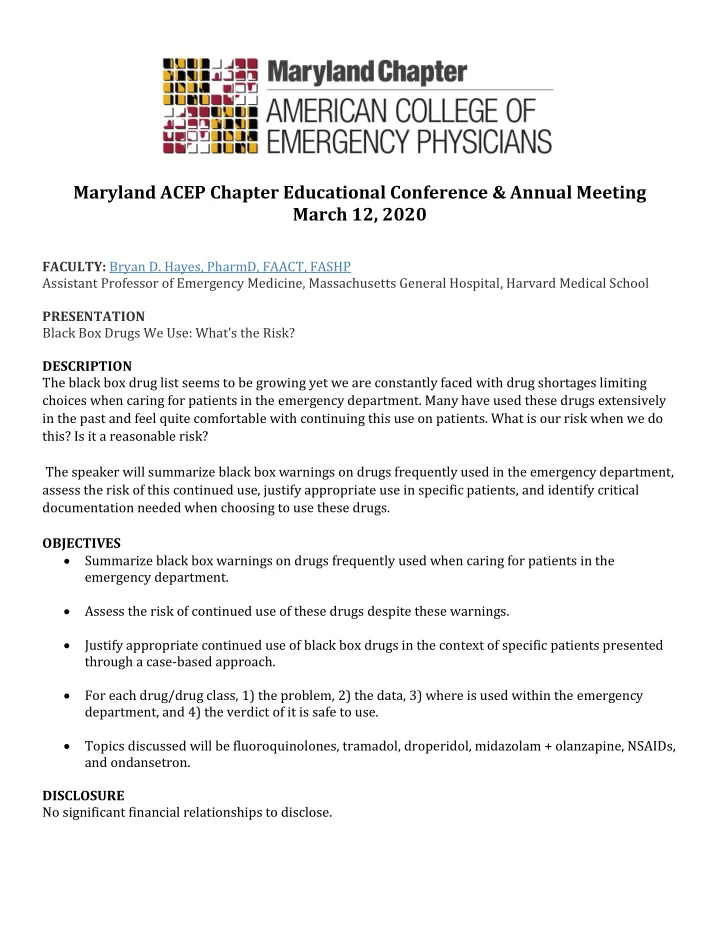

Maryland ACEP Chapter Educational Conference & Annual Meeting March 12, 2020 FACULTY: Bryan D. Hayes, PharmD, FAACT, FASHP Assistant Professor of Emergency Medicine, Massachusetts General Hospital, Harvard Medical School PRESENTATION Black Box Drugs We Use: What’s the Risk? DESCRIPTION The black box drug list seems to be growing yet we are constantly faced with drug shortages limiting choices when caring for patients in the emergency department. Many have used these drugs extensively in the past and feel quite comfortable with continuing this use on patients. What is our risk when we do this? Is it a reasonable risk? The speaker will summarize black box warnings on drugs frequently used in the emergency department, assess the risk of this continued use, justify appropriate use in specific patients, and identify critical documentation needed when choosing to use these drugs. OBJECTIVES • Summarize black box warnings on drugs frequently used when caring for patients in the emergency department. • Assess the risk of continued use of these drugs despite these warnings. • Justify appropriate continued use of black box drugs in the context of specific patients presented through a case-based approach. • For each drug/drug class, 1) the problem, 2) the data, 3) where is used within the emergency department, and 4) the verdict of it is safe to use. • Topics discussed will be fluoroquinolones, tramadol, droperidol, midazolam + olanzapine, NSAIDs, and ondansetron. DISCLOSURE No significant financial relationships to disclose.
Black Box Drugs We Use: What’s the Risk? Bryan D. Hayes @PharmERToxGuy
“Serious or life - threatening risk”
37% consider boxed warnings Smollin CG, et al. J Med Toxicol 2016;12:180-4.
FLUOROQUINOLONES
Tendon Rupture 4.1 fold ↑ (elderly + steroids) 43.2 fold ↑ Achilles Corrao G, et al. Drug Saf 2006;29(10):889-96.
Seizures Neuropsychiatric Effects
Myasthenia Gravis
Peripheral Neuropathy RR 2.07 Etminan M, et al. Neurology 2014;83:1261-3. Francis JK, et al. J Investig Med High Impact Case Rep 2014;2(3).
QT Prolongation Moxifloxacin > Azithromycin
C. difficile aHR 3.44 Pépin J, et al. Clin Infect Dis 2005;41(9):1254-60. Sarma JB, et al. J Hosp Infect 2015;91(1):74-80.
Aortic Dissection/Aneurysm RR 2.43 Lee CC, et al. JAMA Intern Med 2015;175(11):1839-47.
Hyperglycemia (up to 7/1,000) Hypoglycemia (up to 10/1,000)
Retinal Detachment (RR 4.5) Etminan M, et al. JAMA 2012;307:1414-9. Raguideau F. JAMA Ophthalmol 2016;134:415-21.
ED, ED Obs, Inpatient Boarders, Discharge Rx
2018 NO ALTERNATIVES Uncomplicated UTI Acute bacterial exacerbation of chronic bronchitis Acute bacterial sinusitis
TRAMADOL 8 boxed warnings!
Respiratory Depression Accidental Ingestion NAS Concomitant benzos
Abuse Dependence Withdrawal Senay EC, et al. Drug Alcohol Depend 2003;69(3):233-41.
‘Messy’ pharmacology Erratic metabolism Young JW, et al. CMAJ 2013;185(8):E352. Leppert W. Pharmacology 2011;87(5-6):274-85.
Prevalence of Tramadol Consumption in First Seizure Patients: a One-Year Cross-Sectional Study Asadi P, et al. Emerg (Tehran) 2015;3:159-61. 22% of first-seizure pts had recent tramadol use 1. Mean total tramadol dose in last 24 hours: 140 mg 2. Duration of tramadol use less than 10 days: 84.5% 3. Seizure within 6 hours of tramadol consumption: 74%
Hypoglycemia OR 2.61 Fournier JP, et al. JAMA Intern Med 2015;175(2):186-93.
DOES IT WORK? Osteoarthritis: modest Neuropathic: comparable to alternatives Cepeda MS, et al. Cochrane Database Syst Rev 2006;(8):CD005522. Hollingshead J, et al. Cochrane Database Syst Rev 2006;(3):CD003726.
IN THE ED MS: < hydroc/APAP Ankle: = hydroc/APAP Turturro MA, et al. Ann Emerg Med 1998;32(2):139-43. Hewitt DJ, et al. Ann Emerg Med 2007;49(4):468-80.
ED Obs, Inpatient Boarders, Discharge Rx
N/V Migraine CHS Agitation
277 reports > 65 cases > 2 possible Jackson CW, et al. Am J Health Syst Pharm 2007;64:1174-86.
273 OR cases reported (1997-2002) Droperidol ≤ 1.25 mg 10 serious cardiovascular events (2 deaths) No cause and effect Habib AS, et al. Anesth Analg 2003;96:1377-9.
N/V 1.25 mg Migraine 2.5 CHS 1.25-2.5 mg Agitation 5-10
Electrolyte Other QT meds Cardiac ↑ age
ED
“Droperidol is an effective and safe medication in the treatment of nausea, headache, and agitation. The literature search did not support mandating an electrocardiogram or telemetry monitoring for doses < 2.5 mg given either IM or IV . IM doses of up to 10 mg of droperidol seem to be as safe and as effective as other medications used for sedation of agitated patient.” Calver L, et al. Ann Emerg Med 2015;66:230-8.
0.625 mg → 1.25 mg → 2.5 mg* *Except agitation
Midazolam Lorazepam Diazepam
Opioids
↓ resp Opioids
Monitored Setting
ED
IV/IM Olanzapine + IV/IM Benzodiazepine Marder SR, et al. J Clin Psychiatry 2010;71:433-41.
Case reports of postmarketing adverse event experiences with olanzapine intramuscular treatment in patients with agitation Marder SR, et al. J Clin Psychiatry 2010;71(4):433-41. Jan 2004 – Sep 2005 160 cases 29 fatalities 66% concomitant benzos
Chan 2013 (ED) – IV Khorassani 2019 – IV Wilson 2012 (ED) Cole 2017 (ED) – IV Wilson 2012 (ED) Williams 2018 Martel 2016 (ED) – IV STUDY TIMELINE
ED, ED Obs, Inpatient Boarders
NSAIDS (ketorolac, ibuprofen, naproxen)
Cardiovascular thrombotic events ↑ 7 -8 events/ 1000 persons/yr Naproxen safest Coxib and traditional NSAID Trialists’ (CNT) Collaboration, et al. Lancet 2013;382:769-79.
CV disease ↑ age Male gender Duration/dose
GI Bleeding Ulceration Perforation OR: 5.1 Savage RL, et al. Arthritis Rheum 1993;36:84-90.
Anticoagulant/ antiplatelet Duration > 7d Steroids ↑ age
ED, ED Obs, Inpatient Boarders, Discharge Rx
Avoid FQs and Tramadol Use Droperidol & Midazolam Caution: olanzapine + benzos NSAIDs: Use lowest effective dose
Black Box Drugs We Use: What’s the Risk? Bryan D. Hayes, PharmD, FAACT, FASHP Assistant Professor of EM Harvard Medical School/MGH bryanhayes13@gmail.com @PharmERToxGuy PharmERToxGuy.com
Recommend
More recommend